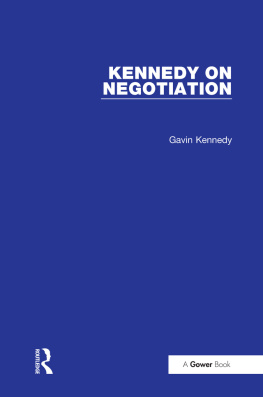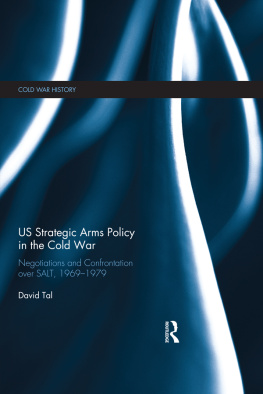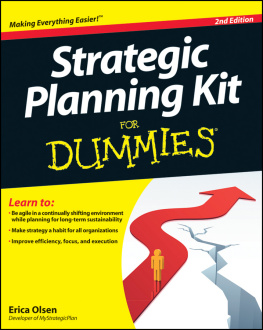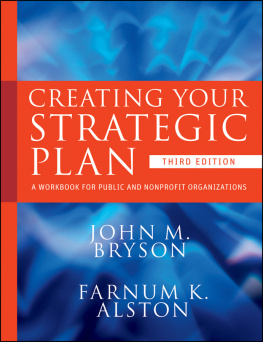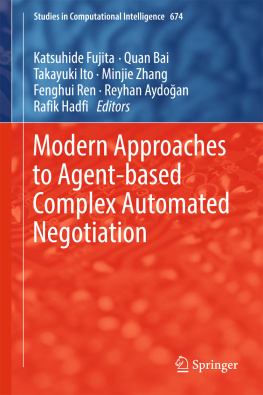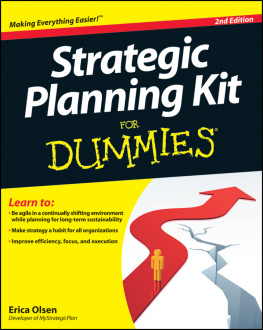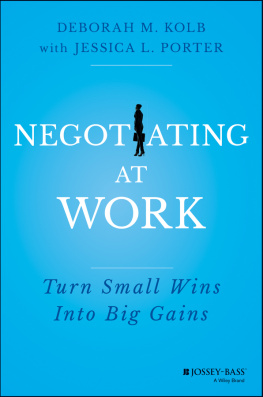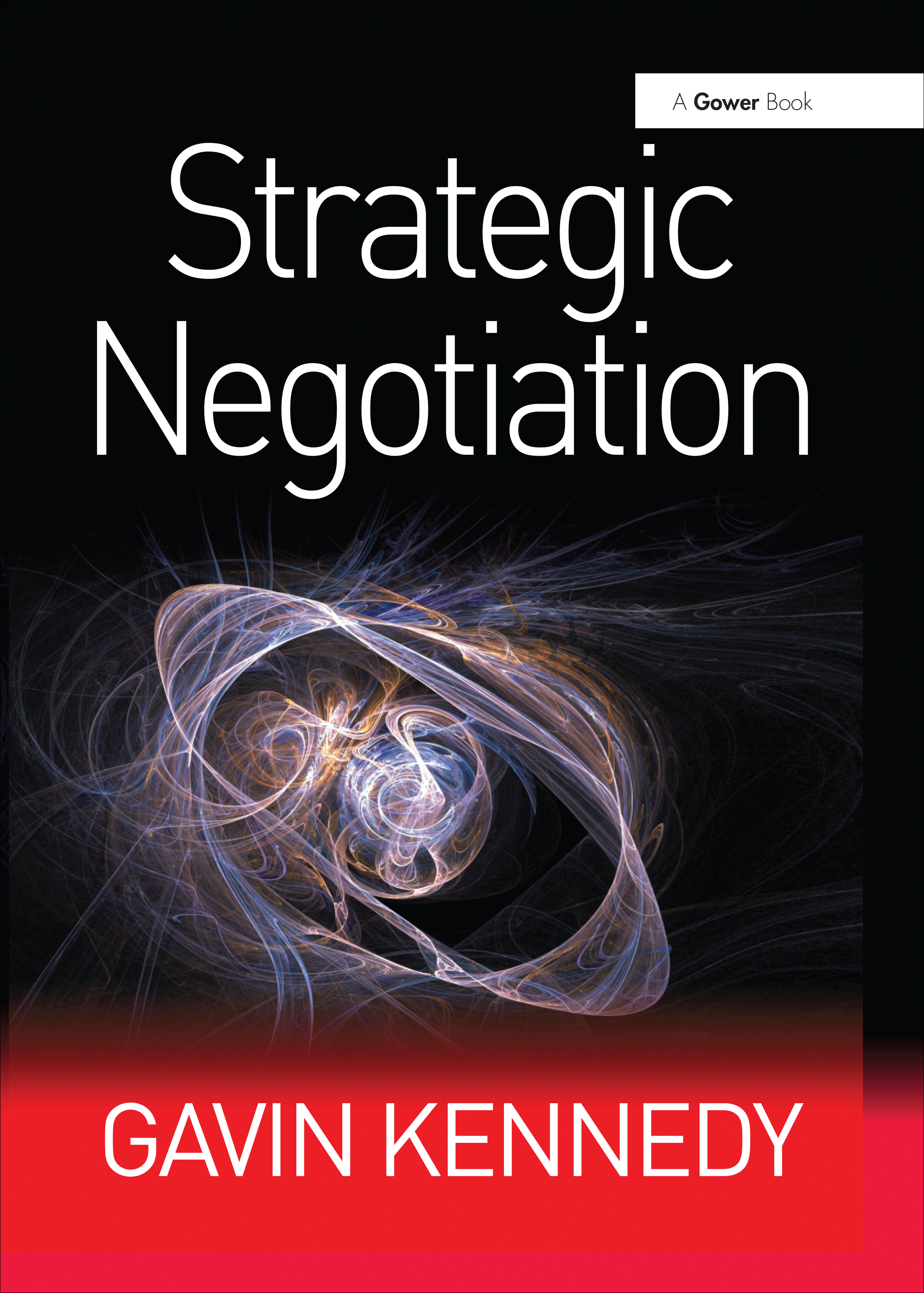Contents
First published 2007 by Ashgate Publishing
Published 2016 by Routledge
2 Park Square, Milton Park, Abingdon, Oxon OX14 4RN
711 Third Avenue, New York, NY 10017, USA
Routledge is an imprint of the Taylor & Francis Group, an informa business
Copyright Gavin Kennedy 2007
Gavin Kennedy has asserted his moral right under the Copyright, Designs and Patents Act, 1988, to be identified as the author of this work.
All rights reserved. No part of this book may be reprinted or reproduced or utilised in any form or by any electronic, mechanical, or other means, now known or hereafter invented, including photocopying and recording, or in any information storage or retrieval system, without permission in writing from the publishers.
Notice:
Product or corporate names may be trademarks or registered trademarks, and are used only for identification and explanation without intent to infringe.
British Library Cataloguing in Publication Data
Kennedy, Gavin
Strategic negotiation : an opportunity for change
1. Negotiation in business
I. Title
658.4'52
Library of Congress Cataloging-in-Publication Data
Kennedy, Gavin.
Strategic negotiation : an opportunity for change / by Gavin Kennedy.
p. cm.
Includes index.
ISBN 978-0-566-08797-4
1. Negotiation in business. I. Title.
HD58.6.K48 2007
658.4'52-dc22
2007002015
ISBN 13: 978-0-566-08797-4 (hbk)
ISBN 13: 978-1-138-26328-4 (pbk)
Contents
For Felix and Ren
Strategic Negotiation Process Model
Force field diagram
Increasing distant sales
Locating wholly owned distant facilities to increase distant sales
Acquiring a company with wholly owned distant facilities to increase distant sales
negotiating range in a licence agreement
Licensees negotiating range
Negotiators entry and exit point
Entry strategy opening close to clients exit price
Force field diagram
Force field diagram: additional categories
Perception of power/expectations relationship
Expanded force field
Expanded force field applied to a Virgo negotiable issue
Expanded force field applied to a banks negotiation with a corporate borrower
Ahmeds force field solution
Power balance ratio
Expected average outcome: pure compromise vote, no bargaining
Stability analysis for the police complaints issue
Negotiation landscape for the reform of complaints procedures
Salience relationship analysis: ACPOS v Executive
Strategic Negotiation Process Model
Selected factors affecting reward design
Correlations between elements and objectives in a pay package
Bid/no-bid decision
Power balance ratio for warranty condition
Power balance ratios for proposals for several major issues
Issue: independent complaints procedure
Stakeholder classification (from ACPOSs perspective)
Commercial imperatives
Operational imperatives
Impact of imperatives on HR strategies
Impact of imperatives on financial strategies
Derivation of the Negotiation Agenda topics
Commercial imperatives
Operational imperatives
Impact of imperatives on HR
Derivation of the Negotiation Agenda topics
Impact of imperatives on financial strategies
Negotiation Agenda for a PFI contract
No matter how skilled at negotiation you might become, if you are pursuing inappropriate strategies, your negotiation skills wont pull rabbits out of a hat (like magicians who amaze children); conversely if you have brilliant and appropriate strategies, but do not have the requisite negotiation skills to implement them, you will not succeed unless you have the good luck to choose negotiating partners with even fewer skills than your own. Relying on luck is the antithesis of strategy; if you have poor strategies and poor negotiating skills, you will reap what you sow.
Interest in negotiation strategy follows naturally from interest in the process of negotiation. Teaching negotiation skills to managers soon raises questions about how and why they are pursuing this or that objective for which they wish to deploy their improved negotiation skills. If not clearly separated, arguments about appropriate skills easily become confused with implicit differences in strategic objectives.
Strategic Negotiation is different from my other books on negotiation (such as Kennedy on Negotiation, Gower, 1998 and (with Florence Kennedy) Kennedys Simulations for Negotiation Trainers, 3rd Edition, Gower, 2007); it is a step up from introducing negotiators to negotiating skills to introducing them to the different task of preparing them to apply their skills to serve their strategic purposes.
Strategic Negotiation is for practitioners and is based on an elective written for postgraduate MSc management courses at Edinburgh Business School (Strategic Negotiation, EBS, 2005). Its focus is on the generation and implementation of negotiation strategy in business and public organizations and is based on many years of practical experience.
Teaching strategic planning effectively is extremely difficult. Strategy is not a series of axioms to be rote learned; it is about the application of thoughtful analysis to real world problems, with the added complication that there is vast room for error both in the selection of the tools of analysis and in the identification of the real world problem. Strategic Negotiation offers advice in the implementation phase of strategy. It is organized around case examples that demonstrate the application of its Process Model to the real world. The cases are drawn largely from my consultancy work in various industries and business situations, without any pretence to comprehensive coverage; and I also draw upon the work of colleagues who have demonstrated competence in this field. To cover all, or even most, potential applications of negotiation strategy would produce a multi-volume text, which is neither appropriate nor necessary for most purposes. The cases illustrate the application of the core concepts and provide a framework for understanding how the strategic negotiation process can be applied to general situations.
It is important in Strategic Negotiation to remember that you are approaching fairly generic business situations from the functional point of view of a negotiator and not that of other professions such as a lawyer, accountant, finance specialist, marketeer, production engineer, human resource management specialist, or any other of the many functions with which you may be concerned in your organization. It is true that you will touch on many of these functions in this book but you will not, so to speak, be touched by any one of them alone. The negotiation strategist approaches business problems from a different angle to those working exclusively in other functions. It is often a question of Which of my objectives are possible in this situation and how will they be achieved?
As Chester Karrass puts it, though for a somewhat different purpose: You get what you negotiate, not what you deserve, or, as I heard a hard-boiled streetwise person, experienced in the ways of the world, put it: Sometimes you get what you want, sometimes you get what you need, and other times you get what you get. Negotiation is about trying to do better than just getting what you get. Negotiation strategy is about creating the conditions that enable you to get (closer) to what you want. Anybody who tells you that negotiation is easy is obviously the kind of person who makes do with what can be got, which is not quite the same.


